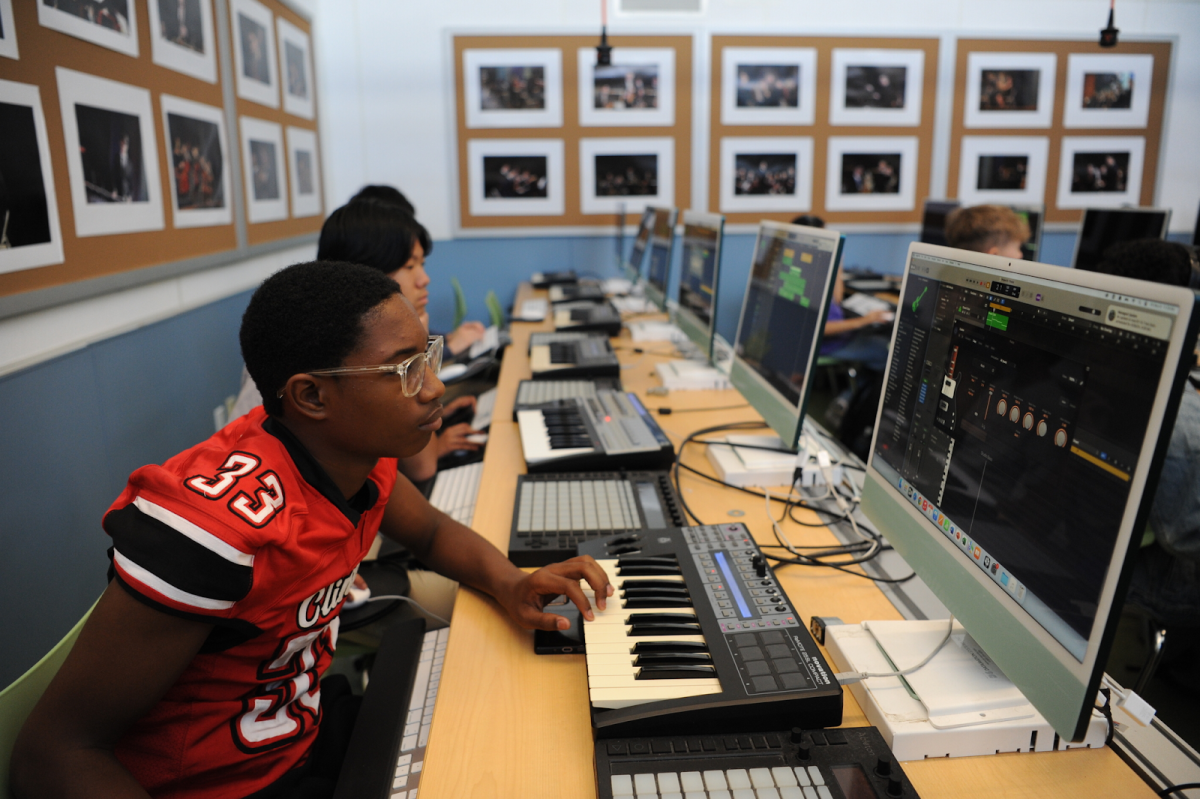Bronx Science’s Digital Music Lab classes present the opportunity for students to expand their knowledge of music theory and the science behind production and sound. In a workshop-style class, they learn the technical aspects of sound design including waveform manipulation, audio engineering, and the use of digital audio workstations (DAWs). Students explore the relationship between acoustics and technology, studying how sound behaves in different environments and how it can be shaped to achieve specific artistic effects. Furthermore, they learn how to use tools such as synthesizers, mixers, and recording equipment, allowing them to produce, edit, and mix music. Learning the reality behind music innovation. MIDI keyboards or MIDI controllers are used individually to create projects. This blend of theory and practical skills prepares students to create professional music while deepening their appreciation for the complexities of sound. Students complete free-reign projects online, making songs individually and in groups.
Bronx Science’s Digital Music Lab
Students learn to use technology to create music, giving them the tools they need to advance toward a music career.
Tags:
- Acoustics and Technology
- Audio Engineering
- Creative Sound Design
- DAWs
- Digital Audio Workstations
- Digital Music Lab
- Hands-on Learning
- MIDI Controllers
- Mixing and Recording
- Music Creation Tools
- Music Production
- Music Technology Education
- Music Theory
- Sound Design
- Sound Editing
- Student Projects
- Synthesizers
- Waveform Manipulation
About the Contributors
Maximilian Duravcevic, Staff Reporter
Maximilian Duravcevic is a Managing Editor for ‘The Science Survey.’ As a managing editor, he revises, and collaborates on articles and manages the workload of his fellow staff reporters, ensuring timely and relevant issues. In the field of journalism, Maximilian (Max) enjoys assisting people in learning, but more than that, he relishes the opportunity to learn for himself, to uncover hidden knowledge, and to share it with his readers. Moreover, he places significant importance on narrating stories and conveying the significance of empathy to his readers. He enjoys telling stories through photography, often capturing photos himself, even making videos, and embarking on journeys to document the perfect moments. He has a deep love for food, with his very first article being about food, and continues to write about environmental and ethical concerns but also gives his own advice and opinions on cooking. His passion for cooking and eating is also prevalent in other places, aiming to learn more about environmental systems in college. Whenever the chance arises, he visits restaurants all over the world, valuing the stories and the satisfaction that good food provides. His daily swimming routine sometimes hampers his eating habits, but he enjoys it nonetheless, and he also indulges in drawing whenever he can. Continuously honing his journalistic skills, Max is committed to keeping them sharp.
Gwyneth Mahase, Staff Reporter
Gwyneth Mahase is a Sports Editor for ‘The Science Survey.’ She is passionate about exploring new aspects of the world and finding the truth through journalism. She loves writing because it is a way for her to express herself and discover her place in the world. Gwyneth appreciates photojournalism’s ability to capture the power of a moment within a single photo. Photography can express people’s raw emotions and their connections with others. Outside of school, Gwyneth participates in two main activities. First, she is an avid member of the Bronx Science Speech and Debate team. Second, Gwyneth is always happiest when she is singing, and she is a devoted member of the National Children’s Chorus. Both these activities are centered around using her voice, which is why she enjoys writing for ‘The Science Survey’ as another outlet for using her voice. She has many favorite books, but if she had to choose one she would choose The Hunger Games by Suzanne Collins. Gwyneth has absolutely no idea what she wants to do in college, but she does know writing will be a part of her future.
Vanessa Encarnacion, Staff Reporter
Vanessa Encarnacion is a Managing Editor and Advisory Editor for ‘The Science Survey.’ She enjoys the story-telling aspects of journalistic writing along with its ability to provide new perspectives on the world that we think we know. She finds photography to represent perfect time-capsules of important moments, and considers it to be one of the most precise types of art. Outside of journalism, Vanessa enjoys exploring other art forms, such as film and music. She plans to study finance in college.

